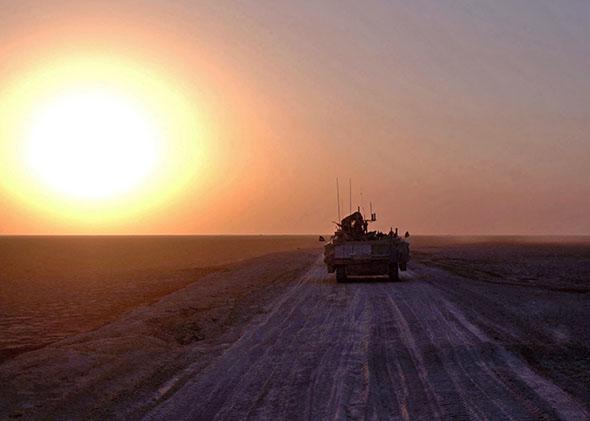Once, O Muse, the poetry of war was song and bravery and the gods. Then the poets of World War I bequeathed us an ironic mode. In his New Yorker assay into the conflict-torn literature of Iraq and Afghanistan, George Packer quotes Paul Fussell: “Every war is ironic because every war is worse than expected.”* True, but war poetry depends on irony for a different reason—because its task is speaking the unspeakable, asking words to bear a load too heavy, under which they warp, fracture, and turn to smoke.
Clichés, which evolve for ease of expression, are the enemy of war poetry. After World War I, writers refuted the beautiful old lies about how combat glorifies and ennobles. They felt that euphemism misrepresented the modern experience, rendering it unrecognizable and leaving them unheard and unseen. The last trace of honor in a world gutted of honor would be the dignity of the unvarnished truth. So the trench-poets and their modernist brethren tore down the arbors, the trellises wound with 19th-century grandiloquence, and left behind a desert. Literature would mirror reality, a wasteland heaped with broken images.
It’s no accident that Letter Composed During a Lull in the Fighting, a new book of poems by Army gunner Kevin Powers, opens in the desert. The “vast unending waste” of Texas, in the first poem, evokes a mental terrain as well as the Iraqi sands in which Powers first “earned … the right to be unseemly,” to reckon up “what’s lost.” No illusions here: In a tone flat as the ground, the poet attacks “jargon … like calling a year a tour,/ even though there are never any women/ in bustled dresses carrying umbrellas.” Not that he provides much of an alternative to jargon. War dries up language, makes the apocalyptic blankness of the combat zone interchangeable with the empty page. It is terribly lonely, but if you let the words back in, something real and necessary might be obscured. That problem is introduced at the end of “Customs,” Powers’ first poem, and worried over for the rest of the collection: “The world has been replaced/ by our ideas about the world.”
How do you get at the hidden truth, the wound beneath the bandaging “idea”? You can—a la Hemingway—stay suggestively silent, doling out understated fragments and allowing your meaning to loom in the empty spaces. In Letter, ironic restraint turns lines like “war is just us/ making little pieces of metal/ pass through each other” into small, bitter IEDs. Elsewhere, Powers shows his anger (“I want the boys at the end of the bar … to know/ that laughter drives me mad … I want to rub their clean/ bodies in blood”) and his alienation (“I am home and whole, so to speak … But I can’t remember/ how to be alive.”) Still, if the experience of fighting opens up a gap between name and thing, all these tactics—monotone observation, rage, wistful melancholy—fail where it really matters. The essential difficulty of language remains.
One of the collection’s strongest poems, “Cumberland Gap,” has 12-year-old Powers leafing through a geography book at school when the librarian comes to fetch him, because “someone was dying.” With a dissociated clarity that recalls Elizabeth Bishop’s “In the Waiting Room,” the speaker marvels:
When the librarian called my name my name
Was made into a kind of spell, dispersing everything
I could identify or claim as being part
Of one certain, undisputed me
What kind of context makes your name—normally the conjurer of all “you could identify or claim” as yourself—scatter away from you? One so incomprehensible and unreal that the name must not be yours; this alien, untrue name undoes you. And that is a nightmarish power of war: It makes the words for things untrue.
Powers is most pessimistic about poetry—which can sometimes seem to take the intactness and efficacy of language for granted—in “The Locks of the James,” where he reflects that “this effort … to reconstruct a moment from my life/ in miniature, knowing that a scale model can accomplish/ nothing” feels “absurd.” Yet it’s not just the pointlessness that gets to him. The speaker walks past a statue of Christopher Newport—“a pirate and a murderer of indigenous peoples,” immortalized in stone. “If I’m honest, I don’t think I cared…which is unfortunate,/ because I am not alone,” Powers writes. In this dismal vision of art, no one minds if it lies.

Photo courtesy Christy Whitney
The dismissal of art’s possibility to represent the truth is an inheritance of the modernists, who broke sharply from the old, high speech to shock readers into awareness. But after a century of rejecting art and beauty as cliché, the war poet today finds himself in an awkward position: this abnegation is itself familiar, a trope. (What makes Iraq different from the blasted Western front? All deserts look alike.) Maybe that’s why Powers seems at least as interested in homecoming as he is in the trauma of combat, his dreamlike scenes of convalescence often admitting a romantic gesture or luminous phrase. “You came home with nothing, and you still have most of it left,” he writes, tracing the theoretical edges of a poetry of return: What does it mean to subtract “nothing” from your life? Is there a “something” underneath all that emptiness?
In one of my favorite poems by Powers, the speaker retrieves a bright memory of his girlfriend in a gingham dress. He starts daydreaming about her, admits:
I don’t care as much
about the fish I pulled
out of the river in a net as I do
you. Most
of what I catch slips back
between
the empty spaces in the old net
anyway.
Most, but not all. The pure, almost blazing, image of the woman in gingham survives. And this is Powers’ rebuke, perhaps, to the notion that all beauty in war literature is a lie. Much is lost to the “empty spaces” in the desert. Some of it can be salvaged. Some of it still gathers in the web of interlaced strands that form our conversations, customs, and shared fantasies. (I doubt Powers set out here to explicitly critique the United States’ treatment of returning troops, but his image hints strongly at a social safety net. The gesture here—closing the wound, mending the weave, pulling things and their names back together so that language can work again—is one of return, but it’s not something veterans can, or should have to, carry out alone.)
Re-entering society requires the soldier-poet to leave the inarticulate desert, where communication always fails. It means recovering ideas, myths, discourse—the healing bits of culture that draw people together. As Powers circles this theme of return, he begins to rehabilitate language, to sew up the gap between word and thing. It is slow going. “You spent the rest of the day listening blankly/ as your friends and loved ones chattered on,/ unable even to speak,” he writes in “Elegy for Urgency.” But then, the grace of a new stanza, a miraculous arrival: “The names of the trees are trees/ and birds are those singing things.” So begins the reforestation of the waste land.
—
Letter Composed During a Lull in the Fighting by Kevin Powers. Little, Brown.
See all the pieces in this month’s Slate Book Review.
Sign up for the Slate Book Review monthly newsletter.
*Correction, April 12, 2014: This review originally misidentified The New Yorker’s George Packer.
